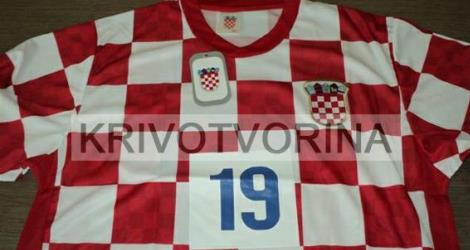28 | 06 | 2016
World Anti-Counterfeiting Day - 8 June 2016

Photo: Customs of the RoC
Initiated by the Global Anti-Counterfeiting Group (GACG) Network, it is now the eighteenth year in a row that the World Anti-Counterfeiting Day is being marked with the aim to increase public awareness of this growing social problem.
This year, the World Anti-Counterfeiting Day is marked on 8 June. In the light of two important sports events – the Olympic Games that take place in Brazil and the European Football Championship taking place in France (EURO 2016) – this year’s World Anti-Counterfeiting Day is indicated by fighting counterfeit sports goods.
Although nowadays there is almost no industry free from a problem of counterfeit goods, which brings not only significant revenue losses in these industries but the losses of workplaces and the losses in state budgets as well due to missing income tax and contributions implied by legitimate business, it is important to remind ourselves on this occasion of the most important results of the study titled “The economic cost of IPR infringement in sports goods”, published by the European Observatory on Infringements of Intellectual Property Rights.
As according to the results of the mentioned study, Italy, Germany and France are the countries with the largest number of sports equipment manufacturers in the territory of the European Union, and their products account for 55% of the total production in this industry sector in the European Union. The sports goods sector, as according to the research work from 2012, employs approximately 43,000 workers in the European Union, and 4,271 enterprises were engaged that year in the manufacturing activities of this sector. Estimation of direct losses of this industry sector due to counterfeiting across the European Union goes to €500 million a year (6.5% of total income of the sector). Losses of workplaces are also connected with it, estimated to be 2.800 of lost jobs across the European Union. The table on page 14 of the study displays the losses of this sector estimated for the Republic of Croatia as well, accounting to €3 million.
The World Intellectual Property Organisation (WIPO) points out to innovations and creativity being crucial drives in the world of sports. New innovations bring thus technological advantages in producing sports equipment (from tennis shoes, over swim suits, all the way to tennis rackets), and trademarks and industrial design as intellectual property rights contribute to the fact that important sports events, teams and competitors are clearly marked and thus differ from one another in a specific way. Also, in order to enable sports fans around the world to directly watch all sports events, significant financial, technical and organisational investments of broadcasting organisations are required, and return of investments shall be achieved from income earned by sports events broadcasting, made possible by protection system of copyright and related rights having an important role in sports as well.
It should not be forgotten that the well-known symbol of the Olympic Games also enjoys special protection within intellectual property rights, subject of a separate international agreement – Nairobi Treaty on the Protection of the Olympic Symbol – which the Republic of Croatia is a party to since 2004.
Due to sports being widely popular, the problem of counterfeiting sports goods is omnipresent, so it has not bypassed Croatia either. The Customs Administration of the Ministry of Finance of the Republic of Croatia, which performs surveillance of imports and domestic market of goods, records the largest amounts of seized counterfeit goods on a regular basis exactly in the area of clothing and accessories, sports goods making an important share among them. In order to prevent consumers from being misled and thus damaged in their rights to get a legal product of adequate quality for their money, with the possibility of using guaranteed consumer rights, we use this opportunity to warn citizens not to buy “a cat in a poke”.
In relation to the risks of buying counterfeit sports goods, we show below a few examples of counterfeit sports goods seized within customs procedures carried out by the Customs Administration of the Ministry of Finance of the Republic of Croatia: